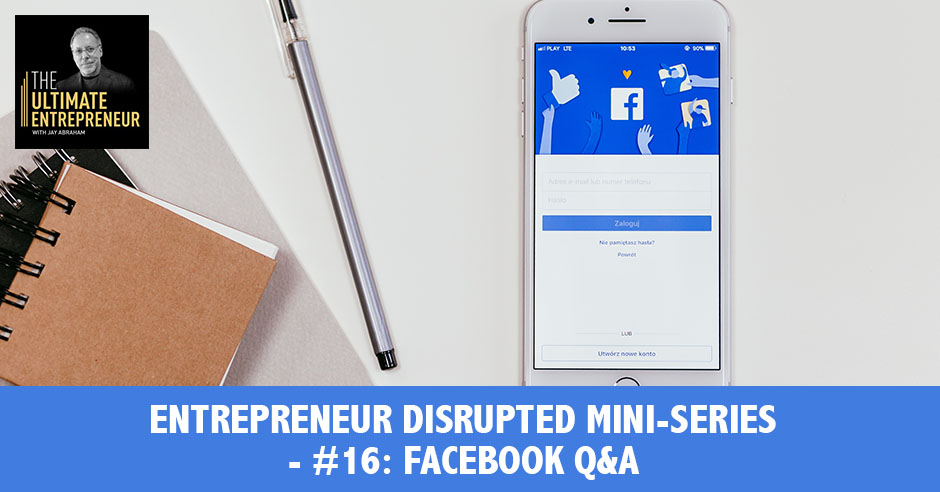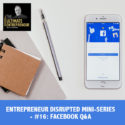
American business executive Jay Abrahams and Dave Asprey, Founder and CEO of Bulletproof, takes live questions on Facebook Live, providing short and concise answers on anything people want to know about business, marketing, and leadership. Jay is one of Forbes Magazine’s top five executive business consultants. He is the guy who started Entrepreneur Magazine and coached the entire Bulletproof team on how to perform better and bringing information out to millions of people. Dave is a Silicon Valley investor and technology entrepreneur and author of the New York Times bestseller, The Bulletproof Diet.
Listen to the podcast here:
Entrepreneur Disrupted Mini-Series – #16: Facebook Q&A
All good things must come to an end but I’d like to think it’s the very beginning of your business, transformative and explosive growth into preeminence. We decided to end the series by having some real fun in answering a handful of your questions from Facebook. We’re going to be addressing your questions regarding, number one, why and how to find investors instead of going alone. Number two, practicing personal affirmations. Do they work? Do they not work? What’s their purpose? Number three, starting a business without going to business school or having formal education. I’ll give you my perspectives as a dropout, and Dave will give you his as a highfaluting multi-discipline college super brain. Number four, monetizing your podcast. There’s pros, there’s cons, there’s in-between, there’s positioning, there’s monetization, there’s crass capitalization, and there’s mediocrity.
Number five, ways to reach out to influencers and bring them value so that they in return will contribute tangible and intangible value, connections, associations, contributions, mentoring, and introductions to you. Number six, valuing your time and choosing when to say no, which is infinitely more valuable and essential, than knowing how to say yes. Number seven, this episode is my big and heartfelt thank you to all of you who have invested your time, your trust, your blind faith, and followed David and I on our wildly disruptive experimental adventure podcast series. I hope you do what is essential to your own business aspirations and take meaningful action from the wisdom and advice and illustrations we’ve distilled in this episode.
This is a special episode of Entrepreneur Disrupted. Jay and I are going to be taking live questions on Facebook Live. We’ll let the questions come in and take them as they go. We’re going to provide short answers. We’re going to go for twenty minutes where people just ask us whatever they like. We have Jay Abraham. If you haven’t heard of Jay Abraham, that’s okay. He is one of Forbes Magazine’s top five executive business consultants. He is the guy who started Entrepreneur Magazine, and a good friend who’s coached the entire Bulletproof team on how to perform better. It’s not like Bulletproof grows all by itself, I work hard on bringing that information out to millions of people.
What we’d like you to do is post some questions. Anything you want to know about business, marketing, and leadership, this is one of the top guys in the world. It’s my pleasure to have him on. These are not random questions. These are not about human performance and smart drugs. These are about entrepreneurship and business, because that’s something I do that I haven’t had a chance to teach about. Many people who are interested in Bulletproof are also interested in entrepreneurship, but it doesn’t make sense for me to talk about entrepreneurship amongst the Bulletproof audience. If you want to do the entrepreneur thing, soon we’ll have a special show in a dedicated channel for that. If you’re following me on Dave Asprey, I’ll answer both questions when I do these, unless I have a world-class business expert on, in which case we’re going to take advantage of his advice. The question is, “When starting a business, is it better to get a loan or an investor to start up?”

I think it’s better to do neither first. It’s better if you can do it to validate your assumption and see if you can find another company, entity, some complimentary or some related enterprise that already has that market and try to pre-validate it before then. Once you have some indication of the demand and the response, then you can make that decision whether to borrow or whether to get an investor. There are wonderful positives and there are wonderful negatives. It also depends on your own capital base at this moment.
If you don’t have enough money to at least validate the idea, it’s better to get investors. If you’re sitting on a few hundred thousand dollars and you’re going to take $20,000, use your own money. If you don’t have the money, getting a loan that you’re going to have to pay off if you don’t succeed, it’s a good idea to work with an investor if you can do that. Loans that are tied to you, unless you’re planning or willing to go bankrupt, there’s a real risk in that. A lot of businesses don’t succeed, a lot do, but you owe it to yourself and your family to pay attention to that and to see what’s going to happen there. “What is the real chance for a new American recession?” Do you pay attention to such things?
There is a case that the economy could be. A lot of real estate people I know are calling for a slowdown and that has a big effect. It depends on what business you are in. Some businesses are greatly benefited by a downturn and some are very adversely affected, but it depends. I have clients in China and their business is down dramatically. Japan is up a bit right now. The world economy is very precarious right now. There’s a couple of high-level advisory report you might read and there’s a lot of disparate positions.
“Number one recommendation. We’re starting a health and wellness business. She’s a hobbyist with all things health and wellness. Looking to increase knowledge and share it with others.”
I always drive people crazy, because I don’t have one answer. Do you have a proprietary methodology? Are you going to teach it one-on-one? Are you going to teach classes? Are you going to teach programs? Do you want to do it on your own with your own facilities? Can you find a facility that has unutilized capacity during the times that your market would want it most? What are you going to price it? Tell me about your competition. Tell me what you got that’s more advantageous. One of the guys that started Planet Fitness was a Jay Abraham zealot. He targeted very specifically the people who wanted to have the feeling of working out but didn’t want to work out very hard. He priced it so that almost nobody ever cancels. I don’t know enough about what you want to do, who you want to do it for, how you want to do it, what you want to price it, how proficient you are, and whether you got something that is distinctive.
Starting a health and wellness business, if you want the highest chance of success, you should start doing massages. Your upside is limited there. Starting a health and wellness business, what’s your target market? What’s your business model? The number one recommendation there is knowing how you’re going to make money. If you’re thinking, “I’m going to start a blog, I’m going to start a podcast and that’s going to be my health and wellness business,” that is a crowded market right now. There are 100,000 of those. Try to do a search for health podcast right now and you might have missed the boat on that, unless you’ve got a very specific angle. If you’ve got some celebrity you are working with or some way to stand out, it is a crowded space. It can be good, but if you’re going to write another book, there’s a perennial market for books. If you haven’t seen Putting My Foot Down, an Amazon number one best seller, which is a picture of a man’s foot and nothing else, you’ll find that there are so many books out there that if you’re self- publishing, have a platform, and building a platform, there’s a whole set of technologies and best practices.
My number one recommendation is that you need to do something that is information-based; understanding information marketing. Jay is a master at that. I’ve worked with Jay and I remember every mastermind I can find, which is a big investment of both time and money, in order to learn what works and what doesn’t work. My finding was that if I wanted to help millions of people, it’s going to take a big microphone, and building big microphone doesn’t happen by accident. It happens with intent, and intent is the next question. “Do you practice affirmations as part of your personal development or shame, or are they hogwash?”
I don’t do personal affirmations, but I’m very clear and very precise in my mind of what I’m trying to accomplish in the stages, that have to be accomplished in timelines, they have to be accomplished, and envision of what that achievement will look like. What I do, and it’s very liberating from a stress standpoint, every evening when I go to bed and every morning when I get up, for five minutes only, I give gratitude statements in my mind to all the wonderful benefits, experiences, benefactors, and positives. I’m not, “I’m going to be rich. I’m going to be rich.” I’m “What’s my goal?” I reverse engineer what has to happen, I timeline it, I have hedge plans in case that doesn’t happen, and it’s very methodical, clinical, and strategic.

“How to start a business if you didn’t study business in school?”
There are many ways to do it. When you have infinite choices, the tendency is not to make the best choice. I’ll say what I told one of my sons. If I wanted to start a business, the first thing I would do is go through a Yellow Pages and look at all the categories. I would pick categories that looked like they would be something I would want, or online, with whatever that has a directory of online and offline businesses. If you’re going to do it on offline, then I would find companies that weren’t exactly competitive. Online, I would find ones that relate, and I call them. If you’re thinking of going in that business or you’re thinking of going into a complimentary business, I’d ask them if you could ask them some questions. If you want to find a business, there are different strategies. Are you trying to make a trillion dollars, or are you trying to make a business that’s a success that you can either pearly to another one, or use the capital or the cash flow?
She was saying, “Do you need to have an education in business to start a business?” Most entrepreneurs don’t have any education in business. If you want to learn how to not be an entrepreneur, go to business school. They did not teach that. They have classes in entrepreneurship. Len Lothian at Wharton, where I went to school, was an effective entrepreneur teacher but that’s an exception, not the rule. They teach you all sort of rules. They’ll teach you some of these things called brules, which is Vishen Lakhiani’s from Mindvalley. He has a way of calling these bullshit rules. They teach you all sorts of things that aren’t necessarily true, especially if you’re a disruptor. That’s what we’re going to be focusing on in the new podcast, is how to be a disruptor. Buy a business textbook. There’s a single book out there called Pocket MBA that tells you everything you learn in MBA program. You mostly learn weird equations. The big thing they teach you is how to work in teams that are too big and poorly put together.
They make you work with six or seven people to solve problems without enough time or resources or knowledge, and then you’ll have to bang heads together. That’s the whole MBA process in a nutshell, as well as learning some politics. It’s nice to have the network, it’s nice to have the branding from going to school, but you can start a business tomorrow and you’re going to do better off listening to some podcasts. Check out I Love Marketing from Joe Polish. Go to Jay’s website, Abraham.com. My main focus is Bulletproof. That’s what I’m doing. That’s how I’m going to change the world. If I’d have known all this stuff that I know now when I was twenty and trying to start my first company, it would’ve been so much easier.
“After studying marketing, I came away with a feeling that it was primarily used for deception and manipulation. I know I can use it for good, but I struggle with uncertainty and reflects my marketing abilities. Have you ever had to convince yourself as a marketer that you’re dead certain your product, brand and image is the right one before you convey it to your audience? How did you accomplish this?” Yes, you can use marketing for evil. One of the most horrifying things that I learned at Wharton, we had a marketing class and we proved that in most cases, it’s cheaper to spend a dollar to say that your product or service is superior than it is to spend a dollar making it superior. Even more horrifying is if you make it superior and no one knows about it, what happens? No one buys it and it goes out of business. If you want to have a superior product, your job is to be a superior marketer and have a superior product. Even then, your revenues and your margins may be lower per unit than a crappy competitor who spends a lot of money on marketing, and little bit of money on product.
The counterpoint to that and the one that I believe very fervently in, is that if you do it right, people will feel and see and talk about the difference and they’ll tell each other. You feel different when you drink Bulletproof coffee. That’s the secret to the amazing growth. It’s not marketing. What the real issue is in marketing is don’t use it for evil. Don’t use your chain software. Marketing is a tool. It’s a very powerful tool. You can tell people to spray antibiotic on their soil that disrupts their fertility and causes cancer. We call that weed killer. We would do very bad things with marketing. Let’s look at politics. That’s all marketing too. Communicating effectively, use it for good. I get you there, but if you feel uncomfortable with what you’re doing in marketing, look back to your product. Are you serving the world with it? If so, you should feel a sense of duty and obligation to do marketing at your highest and best level, and if you’re not there, you’ve got to know why.
Your question belies a different question, “Is the foundation of the product or the service you’re selling meaningful and a superior value?” Does it add value to the market you’re targeting? If it doesn’t, the greatest or the worst marketing is not going to matter. The public will find out. I never have a problem crafting wonderful marketing, wonderful communication, and wonderful positioning for my clients because I am discriminating. I don’t take clients that don’t have something they’re offering that is preeminent. Preeminent doesn’t necessarily mean premium price. It means the best value, the best outcome, the best protection, the best service, and the best support for what it is. You’re getting a hang up because it appears you’re looking at a quick generate sales. You can’t quick-generate sustaining sales for a business that is founded on an inferior offering to the market.
The key to everything is that people buy value. They buy advantage, they buy protection, and they buy a sense of connection with the vendor or with the provider where they see him or her or a company looking out for their best interest in whatever price or application category that you’re targeting in. Once you’ve got that, it’s hard to write bad copy, because copy is based first and foremost on the concept. If the concept is, “We’ve worked very hard and we’ve invested twice as long and we’re making half the profit, but we think that the other offerings aren’t giving you what we will feel you need and here’s what we feel you need and why,” I said that simplistically, but that’s powerful. You go to intention first.
“How do you monetize a podcast business?” Jay and I were talking about this, because our new podcast is entirely not monetized. Monetizing a podcast business is tough. Bulletproof Radio, at 32 million downloads now, is a very successful podcast. It’s number one ranked in health and fitness much of the time, and it’s not paying for itself. If you look at it from revenue, I have two sponsors an hour. What you can do is you can build up a huge catalog and get lots of downloads, and what’s most tracked by advertisers is current downloads. Bulletproof Radio gets about a quarter million an episode, and then there’s a back catalog that keeps growing and growing. Your ways to monetize the podcast are you can sell ads. Ads are not as lucrative as you might think they are.

You can sell sponsorships. There are a lot of podcasts now, so unless you are going to invest in the equipment, put out a lot of episodes, have very high production values, and have the skills and ability and knowledge to have interesting and useful content, at that point you start to look like a radio station. You might consider partnering someone who’s worked at a radio station, or potentially a TV station depending on if you want to do video. Selling ads and selling sponsorships are the most common ways of monetizing.
I use it for distributing the Bulletproof message. You can occasionally do affiliate deals, but those are hard to track because people usually want to use your code. I use Bulletproof as a tool for good to share important knowledge and let people get to know what Bulletproof is all about, on the hope, with no metrics, no tracking and no knowledge, that some of them are going to go, “Having listened for a hundred hours to this guy, there’s some substance to him.” At that point they’re going to go over to Bulletproof and they’re going to try Brain Octane and Bulletproof coffee beans and they’re going to feel different and that’s a win.
I would do this podcast if I wasn’t running Bulletproof and all I was doing was podcasting and I was working in high tech still, because I love doing it. These are conversations I would pay to have and the fact that a quarter-million people want to listen to a podcast is gravy for me. If you’re going to make a living, you’re probably going to make five to ten grand a month on a podcast after a year of fighting and pushing to get it out there, but if you over-advertise and you over-monetize, it’s bad. Bulletproof Radio may almost pay for itself with those two ads, but I don’t think so, because there’s me and two other people who work on making it. I do two full episodes a week. It’s punishing schedule, but it’s fun too. “What’s the best way to reach out to influencers?”
It depends on where you are on the relevancy scale. If you’re starting out, influencers are relative. You use a stair-step approach. You find influencers who are maybe be, and you start with that, and you’ve got to win them over. It depends on what you want them to do. Do you want them to influence you for your business and your product? Are you trying to get them to endorse you, to mentor you, and to connect you? What your goal is, and then what value do you bring them? If you’re not interesting, if you’re not unique, if your vision or your purpose isn’t compelling, fascinating, and provocative, they’re busy people at any point of the continuum.
What I started doing when I was young was I get local influencers. When I got older and I had some notoriety, I would go to people who were prominent influencers and I would buy them a portion of my time to help them. Based on their outcome and their perspective and their assessment of whether I add value or not, I would either get a recommendation, endorsement, introduction, or a joint venture. If you go to influencers, you’ve got to know what strategic goal you’re trying to do. I don’t think you go to Tony Robbins if you’re never done anything, but if you’re somebody who’s very much a star in your own niche, that’s a totally different strategy.
I caused people to question the generalities and the abstraction of their questions, because they don’t help them get to where they want to go. You got to know where you want to go and why. It sounds like a trip. If Dave and I were here and we happen to be in Redondo Beach, but we didn’t know it, and we wanted to go to Mexico, but we had no idea where it was, we don’t know whether a car was faster or boat, train, Uber or bicycle. Most people, they struggle with these very abstract questions that have no relevancy to outcome, to circumstances and to lowering the hurdle rate.
When you reach out to an influencer, you’ve got to talk about what’s in it for them and question whether it’s a reasonable ask. For instance, I get a lot of requests to write a foreword for books. Writing foreword is a big ask. If I say ‘yes’, and I do occasionally say yes, it creates a dozen more request right away. I’d like to support everyone, but if I do that, I’m not going to see my kids and I’m not going to run my company. It’s one of those things where there are limits. It comes down to how did you reach out to me. It’s different if an introduction comes in from a good friend or a support or someone who helped me with my book and said, “My friend has written something that is meaningful and impactful. Your audience would care about this, and this young entrepreneur doesn’t have a name yet, but this is worth your time and attention. Would you please read it? If you think it’s worthy, would you consider a quote or even a foreword? That’d be amazing.”
The chances of me reading that went way up because it was well-written and because there was a, “What’s in it for me?” It was a chance to help someone who is deserving and will take action and benefit from this. Almost half a million people signed up for Bulletproof and I’m grateful for each and every one of them. I feel like I have a duty of obligation to them including not wasting their time. That perspective is very different. What’s in it for the person you’re asking? If it’s an influencer, it is the chance to help. It’s not a chance to help you. It’s a chance to help a mission, a cause or someone who’s working to do good. That’s what motivates me. There are some influencers who are money grabbers and they’ll say anything to support a company trying to do the take-down business. “Seems like marketing barriers to entry are lower than ever. The impetus for exit with low costs is low as well. It makes for lots of noise. What’s the plan to cut through the digital clutter?”
If you’re saying there’s a lot of noise, meaning a lot of competition, that didn’t cost very much for people to get on, you have to be able to differentiate in a preeminent way. You’ve got to have something remarkable to say and to offer. A proposition, a breakthrough or a disruption, because if you have nothing unique, then you are forgettable. A lot of questions people ask are almost self-evident, don’t you think?
They are that to you and me because we live in a different world. I used to work at an auto parts warehouse for five years. I didn’t always live in this world. I’ve been a coder. I’ve always wanted to start my own company, but I didn’t for a long time. I started working for entrepreneurs and learning, doing different jobs at different companies in Silicon Valley in order to learn the skills it takes to be a CEO. “Do you sponsor Jujitsu fighters?” We sponsor all kinds of stuff with our Ambassador Program. “Pull marketing versus push marketing.”
Pull is stimulating a demand for it. This is where influencers, endorsers and qualitative joint ventures come in. This is where media, this is where credible users, and this is where advisory boards come in. This is where you do a lot of very qualitative market awareness demand and seeding. This is like preparing for the harvest. The other is going right out and trying to push people into submission. There’s an interesting book that was written 25 years ago, very esoteric, by a guy named Eugene Schwartz. It’s something like the techniques for direct response. He talks about the fact that you don’t really create a demand, you articulate and fulfill something that blatantly was always there. Find vehicles that will create awareness, provocativeness, and demand for you and the cost of doing it is lower than driving it. Optimally, you want to do both, and you want to come do a conversion point where you get the best of all worlds, but there are many variables that determine the answer that’s appropriate. There’s not a one-size-fits-all answer.

“What’s the best website for husband and wife plumbing team to generate more retail sales?” I can tell you one where you could learn to generate more retail sales. Joe Polish is a good friend and someone who’s helped me on a whole bunch of amazing levels. He runs Genius Network, but he has a podcast called I Love Marketing, and you can learn a lot from Joe. He started out selling carpet cleaning, but now he teaches some of the best in the world. In fact, we have a Bulletproof Radio episode which is a special edition of Joe Interviewing Peter Diamandis and Tony Robbins. He’s gone that far with marketing, so you’ll learn a lot from him. That’s the best thing to do, is to seek knowledge. I’m not going to be able to tell you the answer to what the best website is to generate more retail sales, but we can tell you the techniques or where to find the techniques that can help you generate more sales. “Most promising new industries currently, how do you guys see the future of biohacking businesses besides Bulletproof?” It’s not exactly Bulletproof, but it’s still industry question. What are the most promising new industries from your perspective, Jay?
This is something that’s really esoteric. I have a couple of clients that are in oncology, and there’s now, customized medicine. There’s a lot of very interesting breakthroughs there. We were talking about things like PRP. I’m absolutely drawn towards Dave, because Dave realizes how much more you can get out of this part of your body, but this part will drive so much growth here. I’ve always been focused on higher performance from everything you do, and anything that can help you develop higher performance for everything you do that can be quantified, and those knowledge bases, whether it’s online, offline, one-on-one, or group, they’re going to be very coveted in the years, because a lot of people are going to have to become much more productive as they become entrepreneurs and they have to compete more worldwide. I also think it’s worth everybody’s studying the BRICS nations. BRICS nations are Brazil, Russia, India, China, and South Africa because they’re growing in relevance. Someone was telling me that 5% of all the ketchup is sold here and 95% is around the world. It’s global whether you like it or not.
I had a chance to spend a day with Chairman and Founder of Conair. That was a remarkable time that this guy sold his Cadillac to get startup capital in 1956 and runs a $3billion business today. He had finished going to China and basically making slightly curled hair popular in China in one year, and did incredible things with sales. He showed me a cool new invention, and I was inspired as an entrepreneur to see how he has grown that. In terms of the future of biohacking businesses, very recently the FTC just cracked it down on ultra violet light, because now tanning is a clear and present danger. That kind of thing opens up biohacking opportunities all over the place, because it turns out a small dose of ultraviolet light is required for you to make vitamin D. Regulatory problems opened up huge opportunities for people to make low-dose ultra violet or controlled dose ultraviolet exposure. I use a sun tanning lamp in the morning.
I live in Canada. It’s part of your circadian rhythm. If you have no vitamin D, your life will suck, and your brain will eventually become disregulated. Your mitochondria won’t like it. Now there’s regulatory oversight that says you can’t sell sun tanning lamps and you can’t say they’re for health. It doesn’t matter. It’s social media. Make a high-quality ultraviolet controlled dose thing, put that out there on the market, and let someone else talk about how good it is for health. There are big influencers like Dr. Mercola who stopped selling his ultraviolet health products because of regulatory stuff. That means that there are now huge opportunities in that space for startups. You can do things with a small startup, even companies that are small like Bulletproof but are big enough that big companies can’t do. You can go out there and do things because you’re too small to attract oversight. All of a sudden people see that. You might get some pain later, but you can still do cool things. Look at things that are hard to do but everyone wants and see what you can do there. There’s a lot there, and there’s also a lot about big data and things that are being attacked right now in the market.
This is something I’m excited about. I love having conversations about business. We won’t be interviewing people on the show. What we’re doing is we’re having deep discussions about what I’m doing in Bulletproof and with Jay and all of his clients and what the mindset of an entrepreneur is, so you can learn how to disrupt yourself, how to disrupt your industry, and build a company that grows quickly. Jay and I have this vision that the world is a better place when we have more entrepreneurs in it, and even better yet more entrepreneurs who are happy and productive and doing good things. It shares what I do in Bulletproof. If you’re biology is turned on, the world’s a better place, so we think we can make a difference for people who want to start businesses or are running them. That’s we’re going to do.
Important Links:









